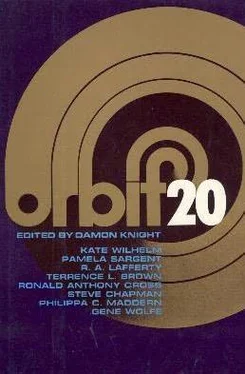Another ex-Clarion student wrote at about the same time: “A few words about how the yarrow stalks have fallen. My apartment has been broken into and ripped off twice: the first time, they got away with a typewriter; the second, about $300 worth of camera equipment. I had a ’64 Mercury. Somebody ripped the chrome swan hood ornament from it. The car broke down and I left it stalled in the parking lot of a nearby apartment complex. It was worth about fifty dollars to a junk dealer. The manager had it towed away; I kept putting off getting it back because I couldn’t afford the charges and had no place to store it. I finally got a registered letter from the wrecking company saying they would auction off the car if I didn’t come down and pay off the towing and garage costs, an amount a little better than $300. ... I recently took a short sojourn through the English department of LSU [Louisiana State University], mainly because I thought I could come out ahead with financial aid. I now owe the state $700. ... I sometimes have the feeling I have been convicted, of a crime I have no memory of committing, and sentenced to life as a character in a Fellini movie.”
Pamela Sargent (“The Novella Race”), who lives in Binghamton, New York, has never won a Nebula or Hugo or attended a writers’ conference.
Carter Scholz (“The Eve of the Last Apollo,” Orbit 18) sent us an invitation to join an art pyramid: “Please send one piece of art (poem, graphic, hunch, etc.) to the first person on this list. Eliminate their name, and add your own at the bottom. Duplicate the top part of this invitation and send it to five people who will never let the on-going documentation of our civilization falter.”
R. A. Lafferty (“Bright Coins in Never-Ending Stream”) wrote to his agent, in response to our criticism of an earlier version of this story: “. . . What is wrong with worms? Just keep saying, ‘They taste like shrimp, they taste like shrimp.’ ”
Terry Carr, editor of Universe and an old friend, sent us a riddle on a postcard, then the answer on another postcard. Then he sent us another riddle: “How do you keep a turkey in suspense?” and never sent the answer. After about two weeks we realized that was the answer.
Terrence L. Brown (“The Synergy Sculpture”) is a new writer who lives in Hood River, Oregon, a town of about 4,000 souls where we grew up; we and Mr. Brown are the only members of the world’s most exclusive writers’ organization, SFWHRO.
We wrote to a promising young writer during the worst month of a bad winter, “I think this is pretty convincing, but it sure is dismal. You are forgetting the implied contract between the writer & reader—‘you pay your money, and I’ll show you something keen.’ A suicidal old guy in a hospital is not keen.”
John Anthony Cross (“The Birds Are Free”) told us some stories about ducks and geese which are too indelicate to print here.
We find ourselves writing to more and more young writers, “You really ought to do something about your spelling.” Some of our best writers are shaky spellers, and Samuel R. Delany is a basket case in that regard, but bad spelling does not guarantee good writing. Every writer who can’t spell should marry someone who can.
Steve Chapman (“A Right-Handed Wrist”) spent some time in a plastics fabricating plant like the one described in his story. Sometimes this kind of thing works and sometimes not; Mark Twain, for instance, never got any fiction out of his printshop experience.
During the bad month referred to above, we wrote to a friend: “I have a cracked great toe (ajar of chicken stock fell out of the freezer on it) and am hobbling. Kate’s pinched nerve is getting better slowly. One of our dumb cats behaved oddly one evening and it cost us $42 to find out that nothing was wrong with him. So it goes, but at least it is raining. ”
Philippa C. Maddern (“ ‘They Made Us Not to Be and They Are Not’ ”) is one of the star pupils of a writers’ workshop Ursula K. Le Guin conducted in Australia a few years ago. She has sold several stories to magazines and anthologies, and it is our opinion that she will be heard from a lot.
We had a letter from Harry Harrison; the contents were not memorable, but the address was: Pilot View, Bullock Harbour, Dalkey, County Dublin, Ireland.
Gene Wolfe (“Seven American Nights”) grew up in Texas, spent some time in the Army, became an engineer, and worked for a large corporation, all without becoming brainwashed by Texas, the Army, engineering, or large corporations. His first science fiction story appeared in Orbit 2, eleven years ago; since then he has contributed sixteen more to these pages.
Stories intended for publication should be accompanied by stamped, self-addressed envelopes, and should be sent to Damon Knight, 1645 Hom Lane, Eugene, Oregon 97404.












